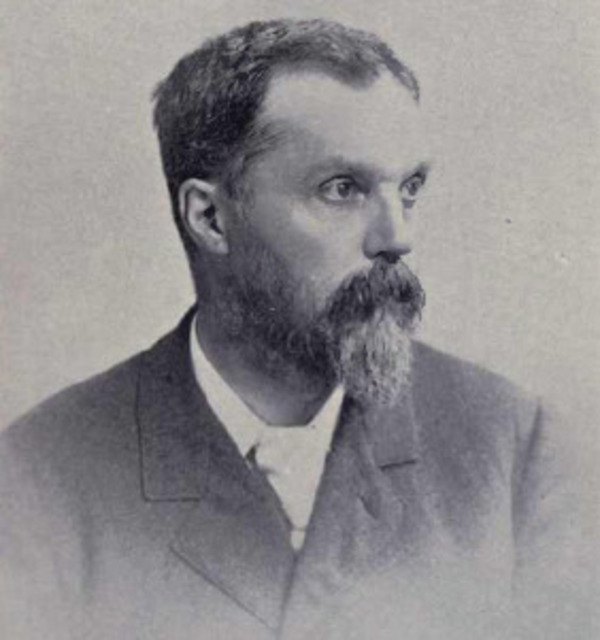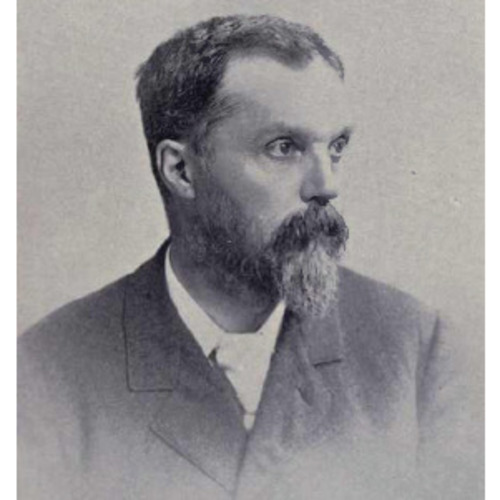
Source: Link
LUXTON, WILLIAM FISHER, teacher, newspaper editor and publisher, politician, and office holder; b. 12 Dec. 1844 in Bampton, Devon, England; m. 4 April 1866 Sarah Jane Edwards of Lobo Township, Upper Canada, and they had six sons and two daughters; d. 20 May 1907 in Winnipeg.
William Fisher Luxton went with his parents to Upper Canada in 1855. He obtained his education at St Thomas and worked as “a farmer’s chore boy.” After a brief period of teaching he began a newspaper career in 1866 by establishing the Strathroy Age. George William Ross* purchased the paper the following year and Luxton may have stayed to work for him. The two men later published and edited the Seaforth Expositor. Luxton was also editor of the short-lived Home Journal of Goderich, which was published from March to May 1871. That same year he moved to Winnipeg, where he was hired at $500 per annum to instruct some 30 pupils in the first school established under the provisions of the School Act of 1871. One student recalled years later that “we liked him . . . because he made education interesting.”
With his savings and a $4,000 loan from John A. Kenny, a retired farmer from Ontario, Luxton started a Liberal newspaper, the Manitoba Free Press, a four-page weekly, in November 1872. As more Liberals arrived in the province, the paper grew rapidly: within two years it was a daily with over 1,000 subscribers and by 1882 it had expanded from 5 to more than 60 employees and had relocated from its original tar-paper shack to “an imposing two-storey edifice.”
Prospering in Winnipeg’s boom, Luxton became one of the city’s leading citizens, helping to establish the Winnipeg General Hospital in 1872, contesting the mayoralty in 1874 (he was defeated by Francis Evans Cornish*), and serving on the Winnipeg Board of Trade. He was president of the Agricultural Society in 1878 and its director for ten years, as well as a founder of the Winnipeg Humane Society. In addition, he sat on the Protestant section of the Board of Education of Manitoba and was chairman of the Winnipeg School Board from 1885 to 1887.
Slim and bearded, with a steady gaze, a sharp wit inclined to puns, and a reputedly ardent temperament, Luxton also had a keen sense of a good story. He was an irreverent and outspoken Liberal who served two terms in the Legislative Assembly, for Rockwood (1874–78) and South Winnipeg (1886–88). In the Canadian parliamentary companion of 1876 he declared his main goals to be the implementation of prohibition, the establishment of a “purely secular” school system, and “the abolition of the French language in the Legislature and Law Courts.” Like many western Liberals in the 1880s, he also enlisted in a dangerous and possibly quixotic crusade against the Canadian Pacific Railway. Its ally, Manitoba’s Conservative government, became the butt of Luxton’s barbs and pointed editorials.
When a new Liberal government headed by Thomas Greenway took office in 1888, the Free Press soon turned against it as well, reporting every sign of cabinet backsliding and perfidy, such as giving the CPR grants for the extension of branch lines while choosing to ignore its apparent collusion with the Northern Pacific Railroad to keep freight rates artificially high. As for the emerging controversy over the Manitoba school question, the fighting editor, with more perception than discretion, characterized it as a fraudulent diversion of public indignation onto Franco-Manitoban Catholics, designed to distract voters from the Greenway government’s surrender to the railway barons.
Luxton’s opponents got their revenge. In a deal arranged in September 1888 by the president of the CPR, William Cornelius Van Horne*, after Winnipeg’s boom had collapsed, Luxton had accepted a loan, perhaps unwisely, from financier Donald Alexander Smith*. He then missed the crucial repayment deadline of September 1893. Smith and his CPR associates obtained control of the troublesome Free Press [see John Mather] and had Luxton, according to his letter in the Winnipeg Tribune, “turned penniless onto the street without an hour’s warning.” To serve as the new editor, Smith installed Frederick Edward Molyneux St John, formerly of the CPR’s advertising department in Montreal.
Undaunted, Luxton launched another paper, the Daily Nor’Wester, the prospectus for which appeared in late December 1893. He sold the newspaper in 1896 and concluded his journalistic career working for the Globe of St Paul, Minn. From 1901 until his death he was a building inspector for the Manitoba government. He died in Winnipeg of apoplexy.
Luxton had served as a mentor to countless frontier newsmen, including William Coldwell, Frank Oliver*, Frederick Coate Wade, William Edward Maclellan, George Henry Ham, William Joseph Healy, and John Wesley Dafoe*. His funeral procession, including a guard of honour provided by the Winnipeg Typographical Union, was one of the longest in the city’s history. Both friends and opponents praised his reputation for accuracy and fearless investigation. Typical of many tributes, that of the Reverend George Bryce* of Manitoba College noted simply that Luxton never betrayed the truth.
In the fall of 1907 Winnipeg honoured one of its early teachers by naming a large new school after him. Another tribute, some 20 years later, came from John Kelly Barrett*, editor of the Northwest Review, who declared that Luxton’s defence of Roman Catholic rights in the 1890s “should be engraved in grateful memory on the hearts of our people.” William Fisher Luxton was not the most tactful or prudent of men, but he was a courageous and influential journalist with a keen sense of justice.
Man., Legislative Library (Winnipeg), Biog. scrapbooks. PAM, MG 14, B33. Northwest Review (Winnipeg), 13 April 1929. Telegram (Winnipeg), 21, 25 May 1907. Winnipeg Free Press, 9 Nov. 1872; 9 Jan. 1888; 25 July 1892; 21 May 1907; 9 Nov. 1922; 19 Oct., 9, 15 Nov. 1957; 16 May, 29 Aug. 1964. Canadian album (Cochrane and Hopkins), 3: 133. CPG, 1876–87. J. W. Dafoe, “Early Winnipeg newspapers,” Man., Hist. and Scientific Soc., Papers (Winnipeg), ser.3, no.3 ([1946–47]): 14–24. Hall, Clifford Sifton. J. A. Hilts, “The political career of Thomas Greenway” (phd thesis, Univ. of Man., Winnipeg, 1974). The Luxton expulsion! Why W. F. Luxton has been expelled from the “Free Press,” and despoiled of the fruits of his life’s work ([Winnipeg, 1893]), a leaflet which reproduces two articles published in the Winnipeg Tribune of 23 and 25 Sept. 1893. Pioneers of Man. (Morley et al.).
Cite This Article
T. Peterson, “LUXTON, WILLIAM FISHER,” in Dictionary of Canadian Biography, vol. 13, University of Toronto/Université Laval, 2003–, accessed September 18, 2024, https://www.biographi.ca/en/bio/luxton_william_fisher_13E.html.
The citation above shows the format for footnotes and endnotes according to the Chicago manual of style (16th edition). Information to be used in other citation formats:
| Permalink: | https://www.biographi.ca/en/bio/luxton_william_fisher_13E.html |
| Author of Article: | T. Peterson |
| Title of Article: | LUXTON, WILLIAM FISHER |
| Publication Name: | Dictionary of Canadian Biography, vol. 13 |
| Publisher: | University of Toronto/Université Laval |
| Year of publication: | 1994 |
| Year of revision: | 1994 |
| Access Date: | September 18, 2024 |



